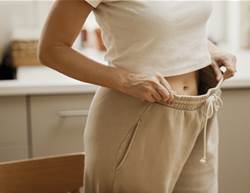For me, it started in university. I was done with the party scene and wanted a healthier lifestyle, so I started exercising and watching what I ate. Other people noticed the results, and I thought, "Wow, I'm good at this." I wasn't doing drugs or having tons of random sex. I thought I was just being healthy.
But over time, my list of "good" foods got shorter, and my list of "bad" foods got longer, and I'd go for longer runs. As I lost more and more weight, I'd think, "Just a few more kilos, a few more kilos…" I was never satisfied.
Looking back, there was also a lot of internal stuff I wasn't dealing with—like never feeling "good enough," and comparing myself to others. I'd also gone through a huge breakup and never really processed the grief. And university is a chaotic time in general, so a lot of things felt out of my control.
I started bingeing and purging on a family trip to South Africa. When you're travelling, it's really hard to control what you eat. And when you break these rigid rules you've had for so long, you have all this guilt and shame. Purging was a way to numb how I felt. After that, I bounced back and forth between the two extremes—from severe restriction to bingeing and purging.
When I eventually told my parents, I couldn't even say it. I was like, "I think I have an issue with food…?" I checked in to an inpatient rehab for two months, followed by three months in a live-in group program. Even while I was in treatment, I was thinking, "I want to get help for the bingeing and purging, so I can go back to my strict diet." It wasn't until halfway through treatment that I realised that was really unhealthy too."
When I left the group program, I considered myself recovered. But a few years later, I relapsed. My parents were going through a divorce, and I couldn't handle the pain, so started running a lot. At first it was great for stress relief and gave me a sense of control, but it became an obsession.
I used to think either you have an eating disorder, or you don't. I assumed that once you went through recovery, you weren't supposed to have hard times anymore. So when I found myself struggling again, I felt broken. But I've realised life comes in waves—it ebbs and flows. Some days are good and some days are tough.
Today, at age 33, I consider myself to be in recovery. I still have to battle thoughts that I don't look good enough, I'm not worthy of something, or that I shouldn't be eating a particular food. I have to talk myself through it—sometimes even out loud. When I'm going into my pantry or my fridge, I'm like, "OK, JJ, what do you feel like today? Will you be OK if you have that? Is that going to mess with your head?" And there are days when I get frustrated, because I think, "Does this ever go away?"
Eating disorders are so different from other addictions, because you don't get to abstain from the thing you're addicted to or terrified of. You have to face it at least three times a day. Doing meal prep at the beginning of the week has been super helpful, because it means I don't have to think about what I'm going to eat at every meal, and I know I'm getting the nutrition I need.
One of my favorite go-to meals is porridge with peanut butter and banana. It's simple and it tastes good—I try to be intentional about choosing foods that taste good, not just foods that are good for me. Incorporating peanut butter back into my diet was huge, because for a long time I wouldn't let myself eat it.
I still try to be active every day, because I feel better when I'm moving. But it doesn't mean I have to go running or have to go to the gym. I try to find fun ways to be active: I go for walks, bike rides or go surfing.
Awareness is key, and it's important to be honest with yourself, so I journal a lot. Right now I'm going through a workbook called Appetite Awareness, because sometimes I have to check back in with myself and see how I'm doing.
I still have to practise listening to my body. I went out of town recently and told myself, "If we go out to dinner, I'm going to give myself the grace to be free and order what I want!" When we arrived at the restaurant, I decided that I wanted a burger. But then the girl who ordered before me got a kale salad, and I thought, "I should order the kale salad." I'm so easily influenced. That's an ongoing battle.
Sometimes I have to be willing to lay down my pride and ask for help. If I'm having a bad day, I reach out to my best friend, Anna. We might exchange a few quick texts ("Hey, I'm struggling today"); other times we talk for hours. Having someone in your life who loves and values you no matter where you're at—and no matter how many times you've asked for help—feels like tangible evidence that I'm not too broken.
There are hard days when I'm like, "Oh my gosh, how am I not better by now?" But talking about my eating disorder is helpful, because when you hear yourself say out loud how far you've come—and what you've overcome—it's encouraging. And I've come a long way.









